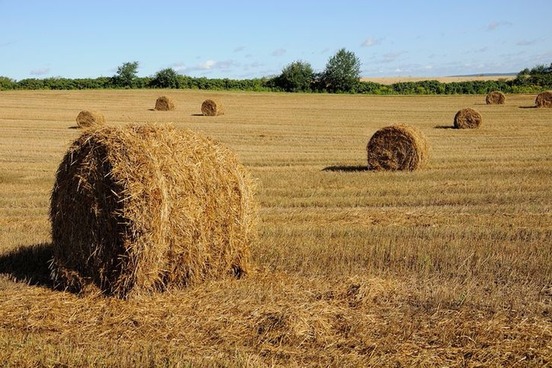(单词翻译:单击)
听力文本
Welcome to Words and Their Stories, from VOA Learning English!
Today, we are going on a make-believe trip to the countryside to learn about a word that comes from something used on a farm – haywire.
Like it sounds, haywire is a strong, thin wire. Farm workers often use it to tie up hay grown in the fields. They roll up the long, cut grass and store it in large bundles.
Later, when farm animals need to be fed, the wire is cut. You need to use a hatchet or something else with a very sharp edge to cut the wire. Haywire does not break easily. But it can get easily twisted together by accident.
So, that is the farm material called haywire. But what does it mean to go haywire? The expression "to go haywire" has several meanings.

"To go haywire" can mean to turn crazy, unreasonable or wild, as in this example: "If I don't take a break from work soon, I am going to go haywire!" Here, the expressions flip out or freak out have a similar meaning. These are all informal or for everyday use. If you want to be more formal, you could use the word berserk.
"To go haywire" also means to start malfunctioning or failing to operate normally. We often use this expression for machines that don't work as they should.
For example, let's say we are visiting a peanut butter factory. A machine used to pump peanut butter into jars suddenly goes haywire. It squirts peanut butter everywhere – on the floor, on walls and on factory workers. Soon the whole area is covered with the tasty, but sticky food! So, the machine is not only broken, it made a huge mess.
"Haywire" can also mean to become out of control. When a process fails to work as planned, you can also say it ran amok. This expression is more formal. Here is an example of this meaning of "haywire."
"Urgh. Plans for my outdoor party just went haywire! The supermarket can't bring the birthday cake. The musicians refuse to play. There's no place to leave a car because of unannounced street repairs in front of my house. Oh ... great. And it's going to rain. It's going to rain hard!"
But how did this simple farm word come to mean "go wild"? Language experts say there are two stories that help explain where this meaning came from.
As we said earlier, Americans use haywire to describe a state of disorder, extreme messiness – in other words, a situation where everything seems to be going wrong.
Years ago, farmers used haywire to temporarily fix a damaged fence, gate or barrier. But the wire was never a good choice for permanent repairs because it breaks down easily. The metal iron turns reddish brown and wears down when attacked by oxygen in the air or water. It other words, it rusts!
This fact, however, did not stop people from using it for repairs. As a result, many fences and buildings where lots of wire were used for repairs look messy. They have gone haywire.
Another story about "haywire" comes from the material itself. When you cut tightly wound wire, you should do so carefully. It can suddenly spring back at you like a snake. It can circle your body and then stab you with its sharp ends. This can happen quickly, often catching a person off guard.
Word experts may not agree on the origin. But they can agree that anything that has "gone haywire," has gone crazy or is a big, hot mess!
And that's the end of this Words and Their Stories.
I'm Anna Matteo.
重点解析
1.peanut butter 花生酱
I had two peanut butter and jelly sandwiches.
我吃了两个放了花生酱和果酱的三明治。
2.out of control 失去控制;失去控制;不受控制
Fires were burning out of control in the center of the city.
市中心的火势失去了控制。
3.spring back 回弹;弹回;回弹分析开关;弹性回复;弹性反冲
Introduced die structure design for the stainless steel CD-Room spring, presented measure prevent spring back.
介绍了不锈钢材质光驱簧片的模具设计结构,提出了防止回弹措施。
4.catch sb off guard 趁某人不备,使某人猝不及防
Catching them off guard may not be a pleasant surprise for them, and you need them to speak positively of you.
让他们措手不及可能不会是一个愉快的惊喜,但你需要他们帮你说好话。
参考译文
欢迎收听VOA学英语《词汇掌故》节目!
今天我们来进行一场虚拟的郊外旅行来学习一个农场里会用到的单词:haywire(捆干草的铁丝)。
从它的发音上便能知道,“haywire”是一种纤细有力的金属线,农场里的工人们经常会用它来捆扎地里的干草,他们把长长的割好的草料卷起来捆成一捆并贮藏起来。
之后,在给农场里的动物们喂食时会切断捆扎草料的金属丝,需要用短柄小斧或者一端很锋利的其它什么东西来切断这根线,这种铁丝很结实,但它很容易会意外扭到一起。
那么,这就是农场里的一种被称为“haywire”的农用用具。但是,“go haywire”又是什么意思呢?“go haywire”这个短语有好几种含义。
“go haywire”可以表示变得疯狂、不可理喻或者狂野,比如这个例子:“如果我还不能从工作中喘口气的话,那我就要疯了!”这里,短语“flip out”或遮“freak out”意思相近。这些都是日常口语中用到的非正式表达,如果想正式点儿可以用单词“berserk(发狂)”。
“go haywire”也表示故障或不能正常运行,我们通常用它来表示“不能正常运转的机器”。
例如,假设我们正在参观一个花生酱厂,将花生酱传送到罐子里的机器突然出故障了,把花生酱喷得到处都是:地上、墙上以及工人身上,很快整个地方都是又美味又黏糊的食物!所以,这台机器不仅坏了,它还弄得一团糟。
“haywire”也可以表示“失控”。如果一个进程没有按计划完成,那么可以说这个进程失控(ran amok)了,这个表达更正式些。下面是“haywire”表达此含义的一个例子。
“呃。我的户外派对计划完全乱套了!超市不能送来生日蛋糕,乐师拒绝前来演出,我家门前未经通知的街道维修导致没有地方可以停车。哦……真棒,竟然还要下雨,还是大雨!”
但是,这个简单的农场单词是怎么有了“疯狂(go wild)”这个含义的呢?语言学专家称有两个故事可以帮助解释这个含义的来源。
正如我们之前所说,美国人用“haywire”来描述杂乱、极度混乱的状态。换句话说,一种似乎一切都出了问题的局面。
很多年前,农场主用金属线来暂时性修补损坏的栅栏、门或者棚栏,但是这种金属线不适合拿来做永久性修补,因为它很容易坏掉,这种金属铁被空气或者水里的氧气侵蚀后会变成红棕色并受到磨损,也就是说它生锈了!
但是生锈的事实并未阻止人们继续使用铁线进行修补工作。所以,那些用了许多铁线进行修补的栅栏和建筑就看上去就会很乱,已经失控了。
另一个关于“haywire”的故事源自铁线本身的材质。当你切断缠绕得很紧的铁线时要特别小心,因为它可能会像蛇一样突然向你这边回弹,它会缠住你的身体,之后用尖锐的两端戳你,这一切可能会发生地很快,常常让人猝不及防。
文字学专家或许在词义的来源上意见不一,但他们一致认为任何“gone haywire”的事物便表示“已经疯掉了或者是个棘手的大烂摊子”。
这就是本期的《词汇掌故》节目了。
我是安娜·马特奥。


